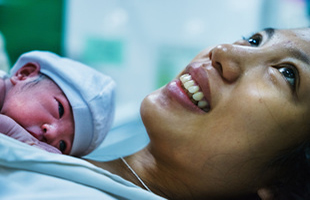
WHO/Y. Shimizu
The neonatal period is one of the most crucial phases in the survival and development of a child. At the recently concluded session of the WHO Regional Committee for the Western Pacific, Member States widely acknowledged the importance of Early Essential Newborn Care (EENC) in reducing neonatal mortality in the Region, and highlighted significant progress made in countries towards scaling-up EENC. WHO was called upon to further support countries in improving the quality of newborn care.
A regional action plan to promote Early Essential Newborn Care
The first time a mother embraces her baby is a moment of immense happiness. However, not all babies get a healthy start in life. In fact, one newborn dies every two minutes in the Western Pacific Region due to inappropriate clinical practices at the time of birth and during the first few days of life.
To address this, Member States endorsed the WHO/UNICEF Action Plan for Healthy Newborn Infants in the Western Pacific Region (2014–2020). The plan aims to improve the quality of care for mothers and babies in health facilities, where the vast majority of children are born in the Region. The plan promotes EENC – a set of simple, WHO-endorsed, cost-effective interventions for mothers and newborn babies during the first few days of life. These interventions result in benefits that last a lifetime. They include:
- dignified and respectful care during childbirth;
- immediate and thorough drying of newborn;
- immediate skin-to-skin contact of mother and newborn;
- appropriately timed clamping and cutting of the umbilical cord;
- exclusive breastfeeding;
- Kangaroo Mother Care (KMC); and
- recognizing and treating infections.
Steady progress and growing demand for EENC
In the two years since the action plan was launched, EENC has been introduced to 12 countries coaching nearly 28 000 health workers. But these numbers must grow.
“With Early Essential Newborn Care, millions of babies will have a better chance to enjoy a healthy start to life, thanks to the strong support of Member States, health providers and development partners,” said Dr Shin Young-Soo, WHO Regional Director for the Western Pacific.
Since EENC was introduced, as much as 72% of newborn babies in the 2258 participating health facilities across the Region are now placed in immediate skin-to-skin contact. Close to 50% remain in skin-to-skin contact until completion of the first breastfeeding.
This progress is built on the dedication and hard work of hundreds of representatives from ministries of health, hospitals, professional associations and development partners in the Western Pacific. Together, they developed national action plans, updated national protocols and professional curricula, established mechanisms for coaching health workers and ensured EENC is practised in hospitals and other health facilities.
A long way to go
Unfortunately, many babies still do not benefit from EENC. Some newborns are still separated from their mothers before they can be breastfed. Some babies are not put in skin-to-skin contact at all. Very few preterm newborns receive Kangaroo Mother Care, a practice known to save lives.
While 2258 facilities now participate, an estimated 28 000 health facilities in the Region still need to be brought on board.
“We must maintain the quality we’ve achieved, and accelerate our efforts to reach every mother and child in the Region,” said Dr Shin. "Let's continue working together to ensure each newborn baby in the Western Pacific Region gets a healthy start to life."
